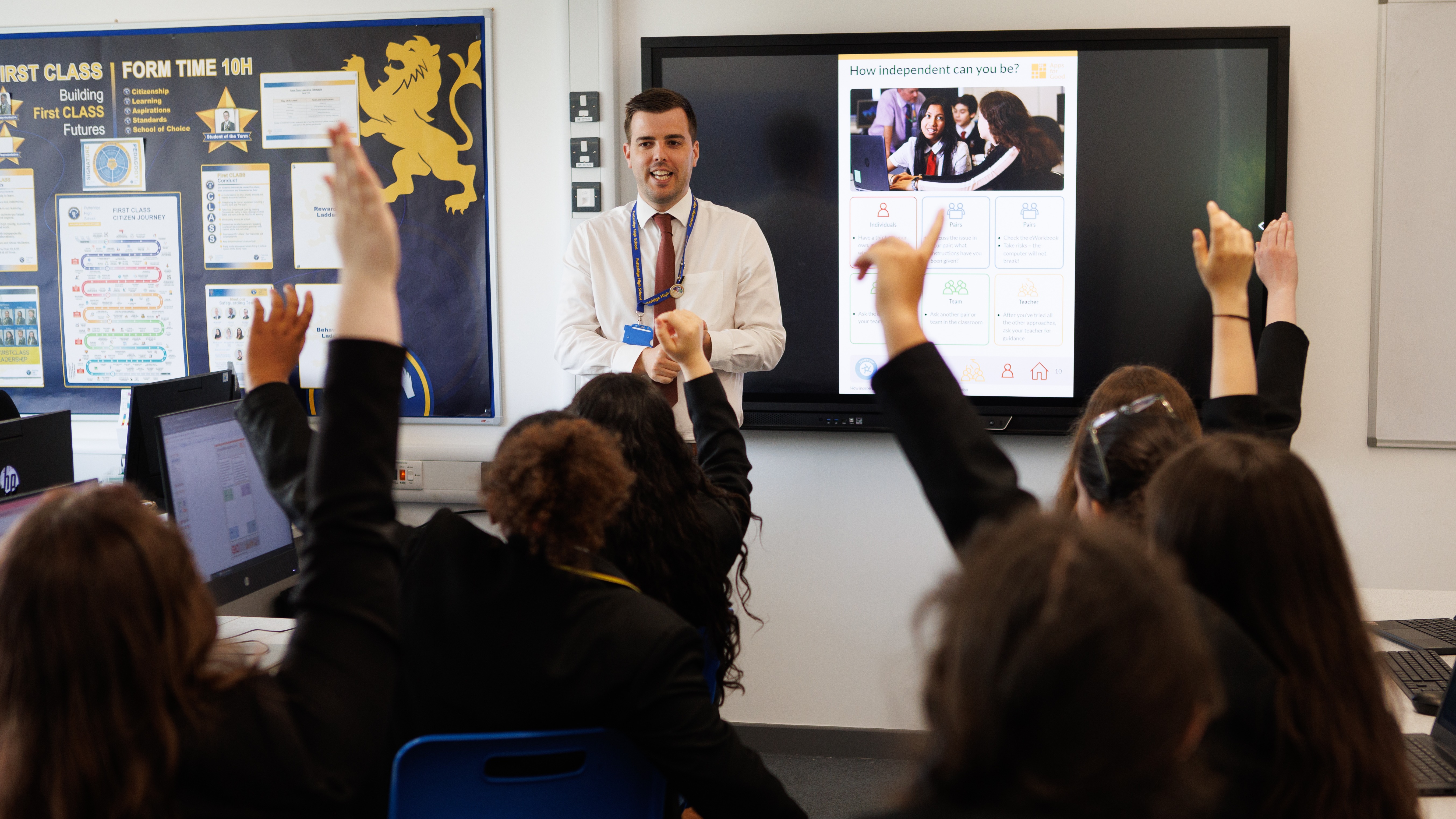10 reasons why teachers need to deliver Apps for Good’s latest courses

Drawing from the very best teaching and learning approaches, our latest courses engage pairs and teams in our new collaborative content – the eWorkbook. The workbook contains bespoke films with stimulating visuals and up-to-date hands-on activities, all in one document.
From July this year, we will be retiring Apps for Good’s older courses. Now's the time to make the switch, and select your theme for a new course; App for Social Action, Innovate for Climate Change or AI for Good.
To book a 1:1 introduction to our latest courses, contact Kathy Sheppard-Barnes (Education Community Manager) by emailing kathy.sheppard-barnes@appsforgood.org.
If you're still delivering one of our older courses, here are 10 very good reasons why it's a good time to make the switch!
1. We've increased support for teachers
We know that teachers have a demanding workload, so we've made our latest courses easier to deliver, with front-loaded support such as a short introduction video on our new resources as well as a video introduction to working in App Lab, the programming tool students will use to create their apps. Detailed how-to information in the eWorkbooks further demonstrates App Lab’s potential for both you and your students. This new level of practical support makes it easier for computing teachers and non-specialist teachers to pick up and deliver our courses.
2. You can deliver the courses in just one half-term
With our latest courses we've reduced delivery time to fit into seven or eight sessions. These courses require just 7 or 8 hours of class time which means they can easily be delivered across one half-term, and fit seamlessly into your annual scheme of work.
3. Our approach to teaching and learning is rigorous
With a dedicated in-house team, including former teachers, we draw on the very best and most up-to-date research. Along with educator and student feedback, our team regularly improves the courses, adding and adapting material. That’s why we encourage you to access the resources online rather than downloading them.
Our courses are now paperless too – caring for the environment, for your budget and freeing up some of your time!
4. Improved diversity and inclusivity
Our new courses engage students with varying levels of attainment. They are also created with diversity and inclusivity in mind so that students, who are underrepresented in the digital economy, see and/or hear from people they can relate to. On a practical note, students learn about Universal Design to ensure their prototype apps can be accessed, understood and used by the greatest number of users, regardless of their age, size, ability or disability.
5. Students develop innovation skills
Drawn from the very best ideation techniques used in industry, our unique Youth Ideation Toolkit enables student teams to develop innovative ideas for a community that they care about. The activities in the toolkit are interactive, collaborative, and fun; encouraging student teams to think outside the box.
6. Mapped to Computing Curriculums
Courses are specifically mapped to each Computing Curriculum in the four regions of the UK: England, Northern Ireland, Scotland and Wales. With the latest courses you know which curriculum requirements you are meeting and how you are meeting them in your lessons. With an emphasis on introductory computing and digital skills, the latest courses develop your students’ practical competencies, preparing them for the future of work.
7. Focus on learning outcomes and student progress
We provide resources for you to assess and report on the progress of each student. Course resources include a learning graph with learning outcomes and a course summary which clearly maps learning development. You’ll have access to each student team’s eWorkbook, a computing self-assessment and a multiple-choice summative assessment, making it easy for you to feedback, evaluate and document student progress.
The eWorkbook is good. I like how it's self-contained and has everything in one place; I’ve created similar style workbooks in the past when I had non-specialists teaching KS3, and that’s where I think a workbook format really comes into its own.”
Jaime Beaumont, Head of Computer Science at Cambridge Stoke College
8. Recognising Sustainable Development Goals (SDGs)
The United Nations SDGs provide a comprehensive framework which can be used in Computing as well as cross-curricula. Each course is clearly aligned to relevant SDGs, helping you to link these important international goals to other topics and subjects.
UN Sustainable Development Goals give us, as a school, a really relevant tie-in to our work trying to achieve the Rights Respecting Schools Award.”
Fraser Christie, Teacher at St Paul's RC Academy
9. Skills Builder accredited
Our courses are Skills Builder accredited. All eight essential skills are incorporated across the courses and support students in developing and benchmarking life-long skills in communication, creative problem solving, self-management and interpersonal skills. The Skills Builder Universal Framework enables your students to build their independence as they develop in education, employment and wider life.
10. Thinking about future careers
Embedded into each course, the Industry Engagement sessions and annual Showcase celebration provide opportunities for your school to meet its career targets. For schools in England, the opportunities provided in the courses align with Gatsby Benchmarks 4 & 5. These effective career interventions effectively broaden a student’s computer science capital, and can encourage more girls and those from underrepresented groups to be part of a new generation of skilled tech employees.
By delivering Apps for Good's new form courses, you're equipping students with the skills, knowledge, and confidence they need to thrive in an ever-evolving digital landscape.
Do you have questions? Book a 1:1 session with our Education Community Manager Kathy, who can help you easily transition over to the right course for your school.
Email kathy.sheppard-barnes@appsforgood.org (LinkedIn/X)
With thanks to Dr Emma Posey, former Senior Learning Manager, Apps for Good (LinkedIn/X)